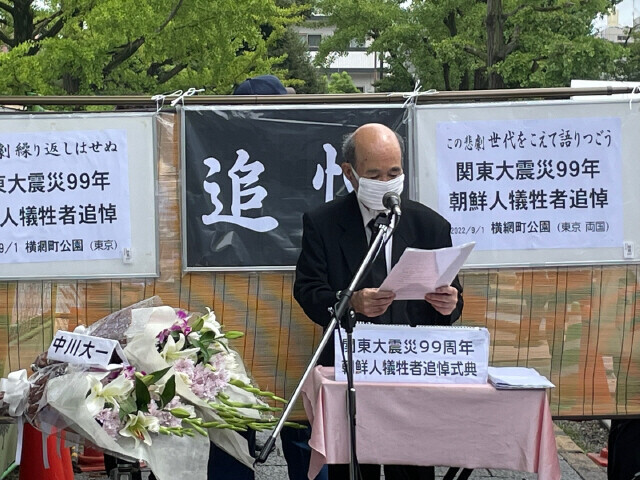hankyoreh
Links to other country sites 다른 나라 사이트 링크
[Editorial] True Korea-Japan reconciliation lies in Japanese accountability for 1923 massacre

100 years ago, on Sept. 1, 1923, a massacre targeting Koreans was carried out in the chaotic aftermath of a devastating earthquake in the Kanto region of Japan.
Japanese police involved themselves, spreading rumors that Koreans were instigating riots. Korean laborers with nowhere to flee were stranded in a miasma of terror and brutally murdered.
The Japanese military and police, as well as vigilantes, are said to have had a role in carrying out the massacre. It was a crime against humanity committed by imperial Japan.
This nearly forgotten page of history was unearthed by the efforts of Japanese citizens, who worked to memorialize the atrocity.
Movements to properly investigate and document the massacre of Koreans cropped up in the 1960s, and for about a decade, Japanese civic organizations met with survivors and witnesses to collect testimonies and documents.
In 1973, on the 50th anniversary of the earthquake, a memorial was erected, and annual memorial services were held there.
Academic research has confirmed that the Japanese police and local governments were responsible for the massacres, as they spread baseless rumors of Koreans committing arson and declared martial law to prevent Japanese citizens from directing their anger at the imperial family and relevant authorities.
Discrimination and prejudice that formed due to Japan’s colonial rule over Korea, and the ruling class’s fear of Korean resistance as shown in the March 1 Independence Movement, also contributed to the massacre.
The governments of both Korea and Japan have remained indifferent and unaccountable in regard to this historical fact.
In 2017, Shinzo Abe’s government responded to the public’s demands for clarification by claiming that there are “no records.”
Tokyo Gov. Yuriko Koike’s refusal to send a letter of condolence to the Korean victims for seven years running is a deplorable act emblematic of the rightward shift in Japanese society.
Japanese far-right groups have been calling for the removal of the memorial to the Koreans slaughtered, making unscrupulous claims that the number of Korean victims was inflated and that the massacre was carried out in self-defense in response to riots by Koreans at the time.
The South Korean government has been equally indifferent to the issue.
Yet in the face of this, many continue to call on the Japanese government to finally come clean and admit its responsibility. Late though the hour may be, the Japanese government must once and for all show the courage to reveal the truth behind this history and apologize.
President Yoon Suk-yeol and Japanese Prime Minister Fumio Kishida are touting the achievements of improving bilateral relations. If the two governments were to jointly investigate the massacre of Koreans at the time of the Great Kanto Earthquake, it would be a meaningful step toward reconciliation.
This issue mustn’t be characterized as “anti-Japan.” Indeed, it would be a courageous decision on the part of South Korea and Japan if they were to work together to set the record straight and ensure that such atrocities against humankind are never repeated.
Please direct questions or comments to [english@hani.co.kr]

Editorial・opinion
![[Editorial] Intensifying US-China rivalry means Seoul must address uncertainty with Beijing sooner than later [Editorial] Intensifying US-China rivalry means Seoul must address uncertainty with Beijing sooner than later](https://flexible.img.hani.co.kr/flexible/normal/500/300/imgdb/original/2024/0517/8117159322045222.jpg) [Editorial] Intensifying US-China rivalry means Seoul must address uncertainty with Beijing sooner than later
[Editorial] Intensifying US-China rivalry means Seoul must address uncertainty with Beijing sooner than later![[Column] When ‘fairness’ means hate and violence [Column] When ‘fairness’ means hate and violence](https://flexible.img.hani.co.kr/flexible/normal/500/300/imgdb/original/2024/0516/7417158465908824.jpg) [Column] When ‘fairness’ means hate and violence
[Column] When ‘fairness’ means hate and violence- [Editorial] Yoon must stop abusing authority to shield himself from investigation
- [Column] US troop withdrawal from Korea could be the Acheson Line all over
- [Column] How to win back readers who’ve turned to YouTube for news
- [Column] Welcome to the president’s pity party
- [Editorial] Korea must respond firmly to Japan’s attempt to usurp Line
- [Editorial] Transfers of prosecutors investigating Korea’s first lady send chilling message
- [Column] Will Seoul’s ties with Moscow really recover on their own?
- [Column] Samsung’s ‘lost decade’ and Lee Jae-yong’s mismatched chopsticks
Most viewed articles
- 1For new generation of Chinese artists, discontent is disobedience
- 2[Editorial] Transfers of prosecutors investigating Korea’s first lady send chilling message
- 3[Exclusive] Unearthed memo suggests Gwangju Uprising missing may have been cremated
- 4[Editorial] Intensifying US-China rivalry means Seoul must address uncertainty with Beijing sooner t
- 5S. Korea “monitoring developments” after report of secret Chinese police station in Seoul
- 6N. Korean media upgrades epithet for leader’s daughter from “beloved” to “respected”
- 7Yoon says concern about biased diplomacy is being incited by “communist totalitarian forces”
- 8[Column] US troop withdrawal from Korea could be the Acheson Line all over
- 9Xi, Putin ‘oppose acts of military intimidation’ against N. Korea by US in joint statement
- 1060% of young Koreans see no need to have kids after marriage